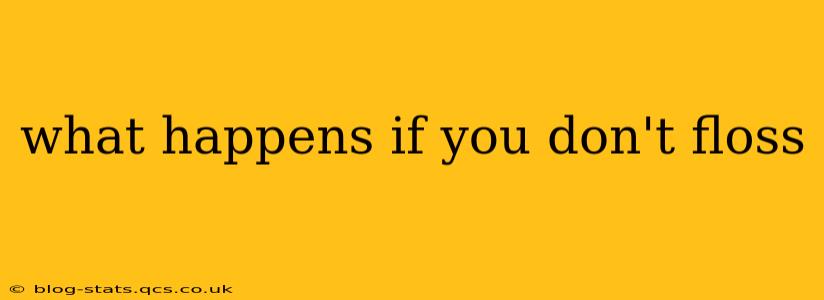Many of us diligently brush our teeth twice a day, but what about flossing? While brushing is crucial, neglecting to floss leaves significant gaps in your oral hygiene routine, leading to a cascade of potentially serious problems. This article explores the consequences of skipping flossing and answers some frequently asked questions surrounding this often-overlooked aspect of dental care.
What are the consequences of not flossing?
Failing to floss regularly allows plaque—a sticky film of bacteria—to accumulate between your teeth and along the gumline. This plaque hardens into tartar (calculus), which brushing alone cannot remove. Tartar not only irritates your gums, but it also contributes to a range of oral health issues, including:
- Gingivitis: This is the early stage of gum disease, characterized by inflamed, red, and swollen gums that may bleed easily. While often reversible with improved oral hygiene, persistent gingivitis can progress to a more severe condition.
- Periodontitis (Gum Disease): This advanced form of gum disease involves the destruction of the tissues and bone that support your teeth. Periodontitis can lead to tooth loss, and has even been linked to systemic health problems like heart disease and diabetes.
- Cavities (Dental Caries): Bacteria in plaque produce acids that erode tooth enamel, eventually leading to cavities. Flossing removes food particles and plaque from between teeth, areas where a toothbrush can't reach effectively, thus preventing cavity formation.
- Bad Breath (Halitosis): Trapped food particles and bacteria between teeth contribute significantly to bad breath. Flossing helps remove these odor-causing elements, improving your breath's freshness.
How often should I floss?
Most dental professionals recommend flossing at least once a day, ideally before brushing at night. This allows the fluoride in your toothpaste to better reach and protect your teeth after the plaque and food particles have been removed.
Is it okay to skip flossing sometimes?
While occasional lapses might not cause immediate harm, making flossing a consistent part of your daily routine is essential for long-term oral health. Consistent flossing is far more beneficial than sporadic attempts. Think of it like exercise; occasional workouts are better than none, but a regular routine yields the best results.
What are the alternatives to traditional flossing?
For individuals who find traditional flossing challenging, several alternatives exist:
- Interdental brushes: These small, brush-like tools are effective for cleaning between teeth, particularly those with wider gaps.
- Water flossers (oral irrigators): These devices use a stream of water to remove plaque and food particles. While convenient, they may not be as effective as traditional flossing in reaching all areas between teeth.
- Dental floss picks: Pre-threaded floss picks offer a convenient and easy-to-use alternative to traditional floss.
Can flossing damage my gums?
Improper flossing technique can indeed irritate your gums, causing bleeding. However, gentle flossing is key. If you experience persistent bleeding or pain, consult your dentist to ensure you're using the correct technique.
What if I bleed when I floss?
Bleeding gums are often a sign of gingivitis, indicating the need for improved oral hygiene. Continue flossing gently; the bleeding should decrease as your gums heal. If bleeding persists, schedule a dental appointment.
How do I floss correctly?
Your dentist or hygienist can demonstrate the proper flossing technique. Generally, it involves gently curving the floss around each tooth, sliding it up and down along the gumline, and using a clean section of floss for each tooth.
In conclusion, flossing is a critical component of maintaining optimal oral health. Neglecting this essential step can have significant and long-term consequences for your teeth and gums. Make flossing a daily habit, and don't hesitate to consult your dentist if you have any questions or concerns. Your smile—and overall health—will thank you.
